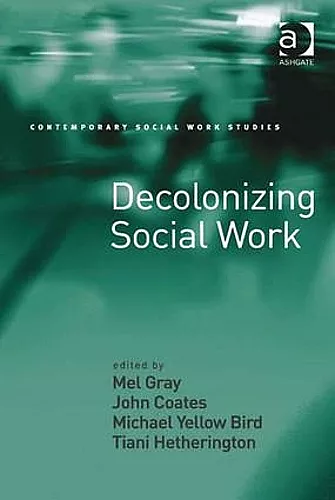Decolonizing Social Work
John Coates editor Mel Gray editor Michael Yellow Bird editor Tiani Hetherington editor
Format:Hardback
Publisher:Taylor & Francis Ltd
Published:12th Jun '13
Currently unavailable, and unfortunately no date known when it will be back
This hardback is available in another edition too:
- Paperback£54.99(9781138247390)

Riding on the success of Indigenous Social Work Around the World, this book provides case studies to further scholarship on decolonization, a major analytical and activist paradigm among many of the world’s Indigenous Peoples, including educators, tribal leaders, activists, scholars, politicians, and citizens at the grassroots level. Decolonization seeks to weaken the effects of colonialism and create opportunities to promote traditional practices in contemporary settings. Establishing language and cultural programs; honouring land claims, teaching Indigenous history, science, and ways of knowing; self-esteem programs, celebrating ceremonies, restoring traditional parenting approaches, tribal rites of passage, traditional foods, and helping and healing using tribal approaches are central to decolonization. These insights are brought to the arena of international social work still dominated by western-based approaches. Decolonization draws attention to the effects of globalization and the universalization of education, methods of practice, and international ’development’ that fail to embrace and recognize local knowledges and methods. In this volume, Indigenous and non-Indigenous social work scholars examine local cultures, beliefs, values, and practices as central to decolonization. Supported by a growing interest in spirituality and ecological awareness in international social work, they interrogate trends, issues, and debates in Indigenous social work theory, practice methods, and education models including a section on Indigenous research approaches. The diversity of perspectives, decolonizing methodologies, and the shared struggle to provide effective professional social work interventions is reflected in the international nature of the subject matter and in the mix of contributors who write from their contexts in different countries and cultures, including Australia, Canada, Cuba, Japan, Jordan, Mexico, New Zealand, South Africa, and the USA.
Prize: Winner of a Choice Outstanding Academic Title Award for 2014 '... most readers will find this book meaningful and provocative. Summing Up: Highly recommended. All academic levels/libraries as well as practitioners.' Choice 'Decolonizing Social Work challenges the profession to take a new path that is creative, critical, and revolutionary. The book examines the profession’s complicity in colonization, both past and present, and explores how social workers around the world are adapting social work to make it locally relevant. The authors help readers understand what decolonizing social work involves, including offering insight into contemporary debates and dynamic dialogues.’ Hilary N. Weaver, State University of New York at Buffalo, USA ’This book fills a significant gap in the literature on social work practice and will be welcomed by indigenous and community based practitioners, as well as social work teachers, supervisors and mentors. The book affirms the need to decolonise monocultural and western frameworks of social work and recognise and apply indigenous values and models when working with indigenous clients and communities.’ Linda Tuhiwai Smith, University of Waikato, Aotearoa New Zealand 'The editors are to be congratulated for providing such an attentive and acutely relevant book to inform social work practice, in regards to countering the effects of ongoing colonization of Indigenous Peoples around the world. Indeed, one of the most dynamic aspects of this book is that it is written from a strong international base by highly knowledgeable contributors, both Indigenous and non-Indigenous, who bring a diversity of perspectives about social work practice, and the continuous struggle to recognize and counter complicit colonization to the detriment of local cultures and communities. ... the book not only fills a significant gap in the literature on social work practice but also reaches out to every profession that is at risk of Whiteness beha
ISBN: 9781409426318
Dimensions: unknown
Weight: 816g
380 pages